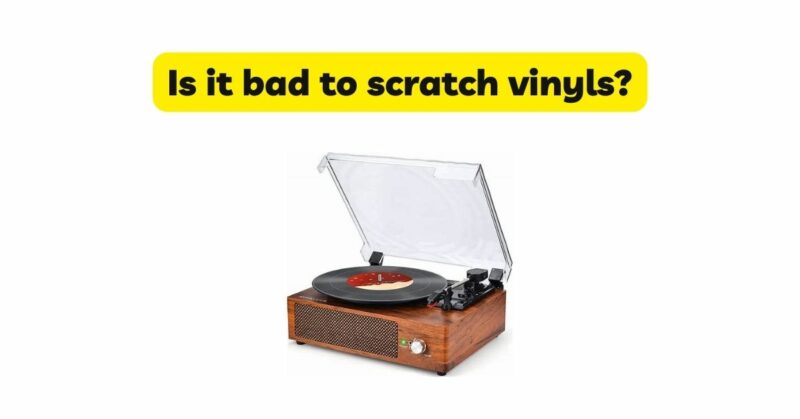Vinyl records have experienced a resurgence in popularity due to their unique sound and tangible appeal. However, scratches on vinyl records are a concern for collectors and enthusiasts as they can impact the audio quality and overall listening experience. This article aims to explore the consequences of scratched vinyl records, highlighting the potential effects on sound quality, playability, and the longevity of the record itself. By understanding the implications of scratches on vinyl, collectors can take necessary precautions to preserve their cherished music collections.
Sound Quality: Scratches on vinyl records can have a noticeable impact on sound quality. When the stylus encounters a scratch while playing a record, it can cause skips, pops, or repetitive loops in the audio playback. The physical damage interrupts the smooth flow of the stylus along the record groove, leading to distortions and inconsistencies in the sound. Additionally, scratches can introduce noise and surface crackles, detracting from the clarity and fidelity of the original recording. The severity of the scratch determines the degree of audio degradation, ranging from minor disruptions to significant disruptions in the playback experience.
Playability and Skipping: One of the most immediate consequences of scratches on vinyl records is the potential for skipping. When the stylus encounters a deep or severe scratch, it may jump or skip forward, causing a portion of the track to be skipped or repeated. This interruption can be frustrating and disrupt the intended listening experience. Not only does skipping detract from the enjoyment of the music, but it also compromises the integrity of the artist’s intended sequencing and flow of the album. Additionally, the repeated skipping motion can further damage the record or exacerbate existing scratches.
Record Wear and Tear: Scratches on vinyl records can contribute to increased wear and tear on the record itself. When the stylus encounters a scratch, it may dislodge particles from the surface or push debris into the grooves. This can result in additional scratches or grooves becoming filled with foreign substances, further compromising playback quality. Over time, the accumulation of scratches and debris can cause cumulative damage, leading to a decline in sound quality and an increased likelihood of skipping.
Damage to Stylus and Cartridge: In addition to the impact on the record, scratches can also damage the stylus (needle) and the cartridge of the turntable. When the stylus encounters a scratch, it may be subjected to excessive wear and tear or get clogged with debris. This can lead to a deterioration in the stylus’s performance, affecting its ability to track the record groove accurately. Moreover, scratches can cause the stylus to experience uneven pressure, potentially leading to misalignment or premature wear of the stylus tip. In turn, this can necessitate more frequent stylus replacements or even damage the cartridge, requiring costly repairs or replacements.
Loss of Collectible Value: For collectors, scratches on vinyl records can significantly impact their value. Collectible records in pristine condition are highly sought after and can command high prices in the market. However, even a single noticeable scratch can diminish the value of a collectible record significantly. Scratches indicate damage and can be seen as detracting from the overall aesthetic and sonic quality of the record. Collectors often place a premium on records in excellent condition, free from significant scratches or surface damage.
Perceived Aesthetic and Listening Experience: Beyond the technical consequences, scratches on vinyl records can also affect the perceived aesthetic and listening experience. Visual scratches on the surface of the record can be visually distracting, detracting from the physical appeal of vinyl as a medium. Moreover, the presence of scratches can create a constant reminder of imperfections during the listening experience, potentially diminishing the enjoyment and immersion in the music.
Conclusion: Scratches on vinyl records can have significant consequences, affecting sound quality, playability, record longevity, and collectible value. The impact of scratches varies depending on their severity, location, and cumulative effects. To preserve the integrity of vinyl records, collectors and enthusiasts should handle records with care, employ proper storage and cleaning techniques, and ensure the use of high-quality turntable setups. By taking preventive measures and understanding the consequences of scratches, individuals can extend the lifespan of their vinyl collections and continue to enjoy the unique audio experience that vinyl records provide.


